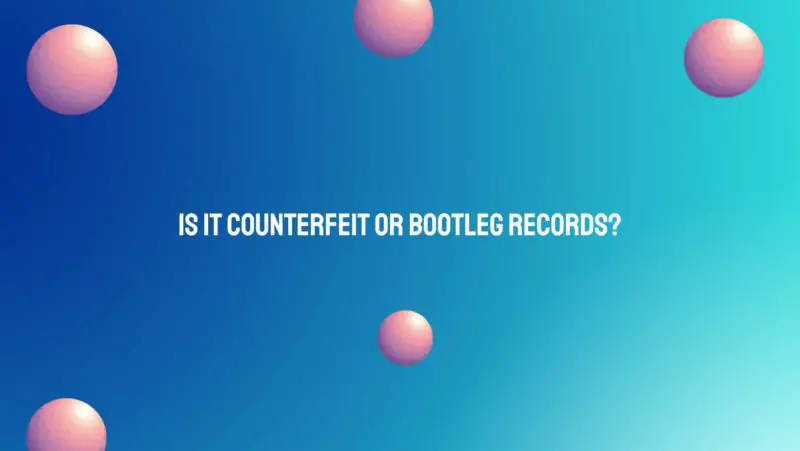The vinyl record collecting community has seen a resurgence in recent years, with collectors and enthusiasts seeking rare and vintage albums to add to their collections. However, in the world of vinyl, terms like “counterfeit” and “bootleg” are often used interchangeably, leading to confusion among buyers and sellers. In this comprehensive article, we will explore the distinction between counterfeit and bootleg records, examining their definitions, motivations behind their creation, and their impact on collectors and the music industry.
Defining Counterfeit and Bootleg Records
Before diving into the differences, it’s essential to understand what counterfeit and bootleg records are:
- Counterfeit Records: Counterfeit records are unauthorized reproductions of legitimate albums or releases. They are created with the intent to deceive buyers into believing they are purchasing a genuine, authorized copy. Counterfeiters often aim to replicate the album’s appearance, packaging, and sound as closely as possible.
- Bootleg Records: Bootleg records, on the other hand, are unauthorized recordings of live performances, unreleased tracks, or even studio albums. These records are typically produced without the consent of the artists or record labels and are not intended to mimic legitimate releases. Instead, bootlegs serve as unofficial documents of rare or unique musical moments.
Motivations Behind Counterfeit Records
Counterfeit records are primarily motivated by financial gain and deception. Here are some reasons why counterfeit records are created:
- Profit: Counterfeiters see an opportunity to profit by producing fake versions of rare or sought-after albums and selling them at inflated prices to unsuspecting buyers.
- Deception: The goal of counterfeit records is to deceive collectors and fans into believing they are purchasing genuine releases. Counterfeiters often go to great lengths to replicate the appearance and sound of authentic records.
Motivations Behind Bootleg Records
Bootleg records, on the other hand, have different motivations behind their creation:
- Archival Purposes: Bootleggers often produce these records to capture live performances or unreleased tracks that would otherwise go undocumented. These recordings are valuable to collectors and fans interested in the historical and artistic aspects of music.
- Niche Market: Bootlegs cater to a niche market of enthusiasts who appreciate the raw and unfiltered nature of live recordings or unreleased material. They are often seen as collectible items in their own right.
Impact on Collectors and the Music Industry
Both counterfeit and bootleg records can have an impact on collectors, artists, and the music industry:
- Collectors: Counterfeit records can lead to financial losses for collectors who unknowingly purchase fake versions of valuable albums. In contrast, bootleg records can be a legitimate source of rare and unreleased music for collectors who understand their nature.
- Artists and Labels: Counterfeit records harm the reputation and financial interests of artists and record labels, as they involve unauthorized duplication and distribution of copyrighted material. Bootleg records may also infringe on copyright but are often tolerated to some extent if they do not directly compete with legitimate releases.
- Legality: Both counterfeit and bootleg records exist in a legal gray area. Counterfeiting is illegal, as it involves the unauthorized replication of copyrighted material. Bootlegging is also illegal but may be tolerated to varying degrees by artists and labels, depending on the specific circumstances.
Conclusion
In summary, counterfeit and bootleg records are distinct in their nature and motivations. Counterfeit records are unauthorized copies of legitimate releases created to deceive collectors, while bootleg records capture live performances or unreleased material for archival and enthusiast purposes. Collectors should exercise caution when purchasing vinyl records, be informed about the distinction between the two, and prioritize supporting legitimate releases to ensure the continued vitality of the music industry.


